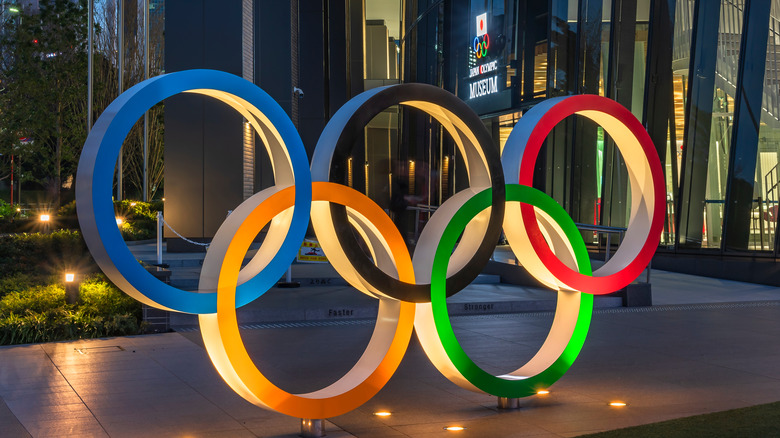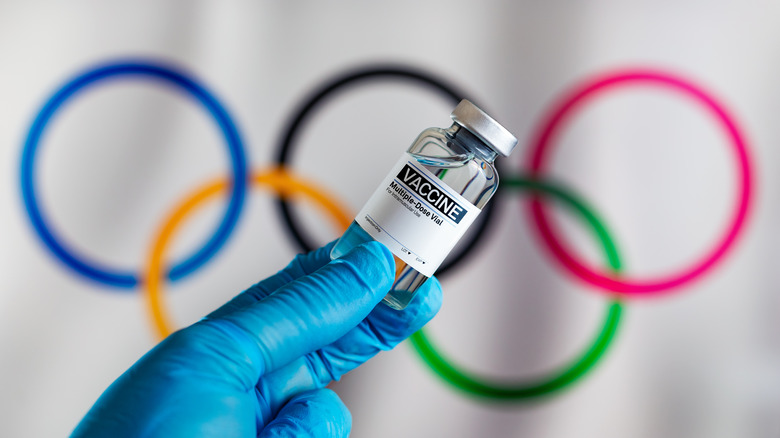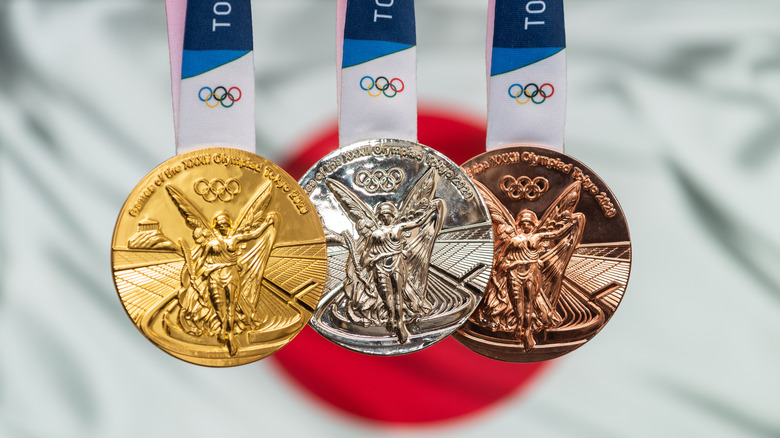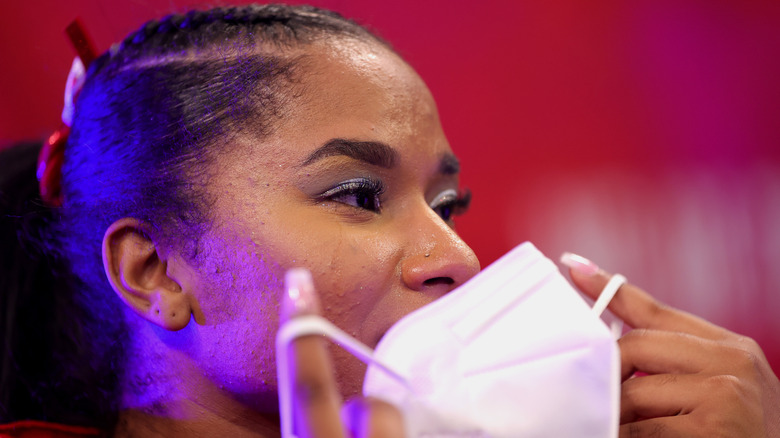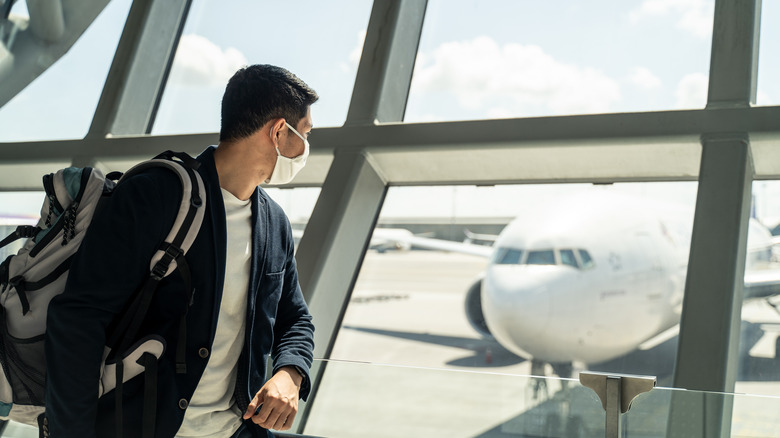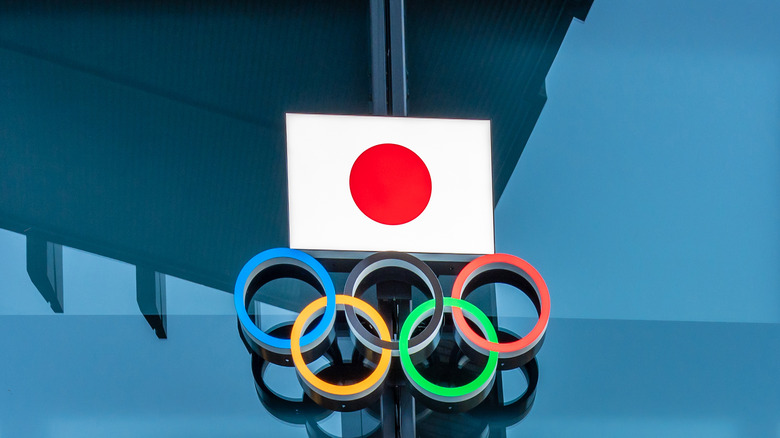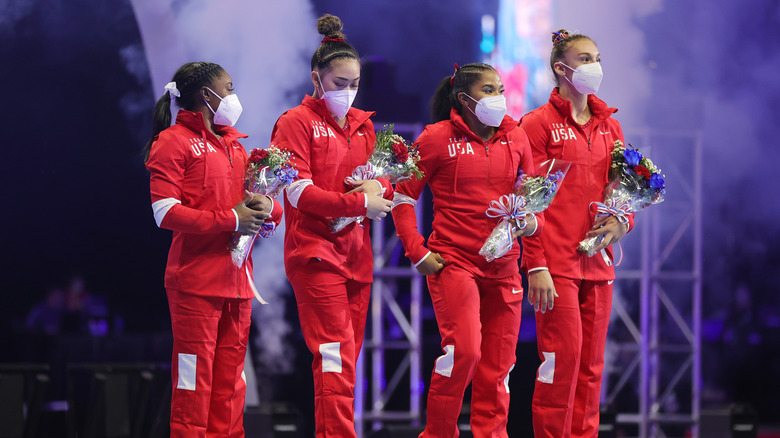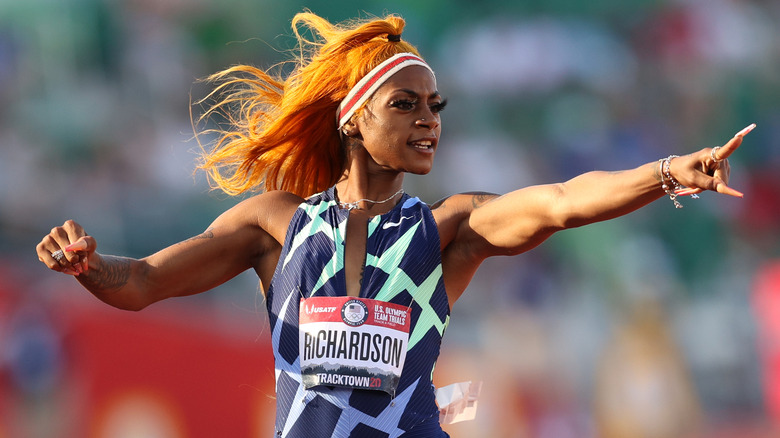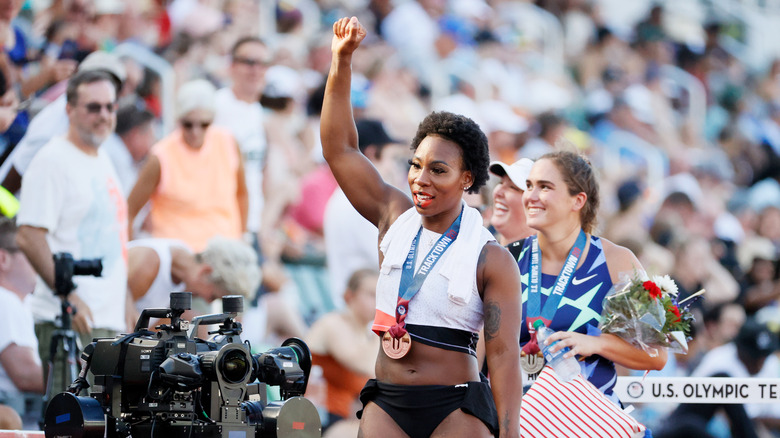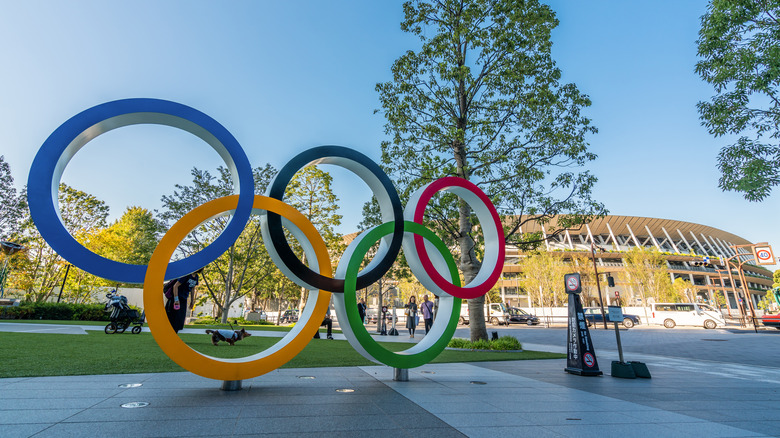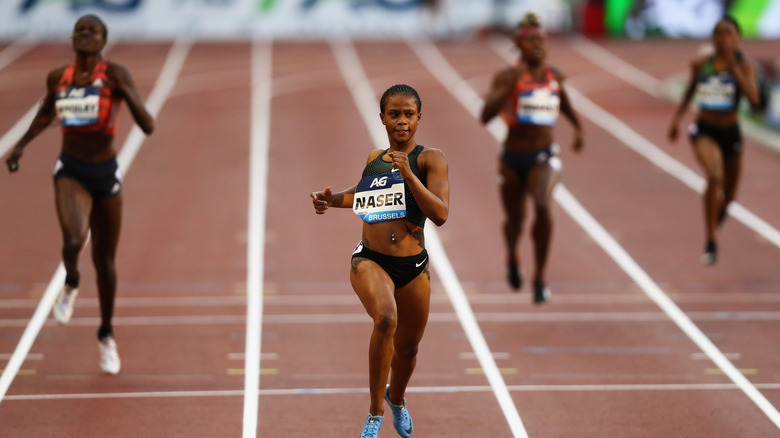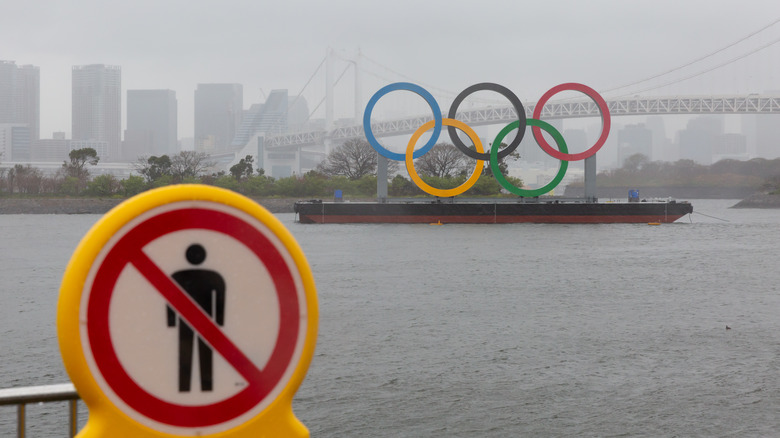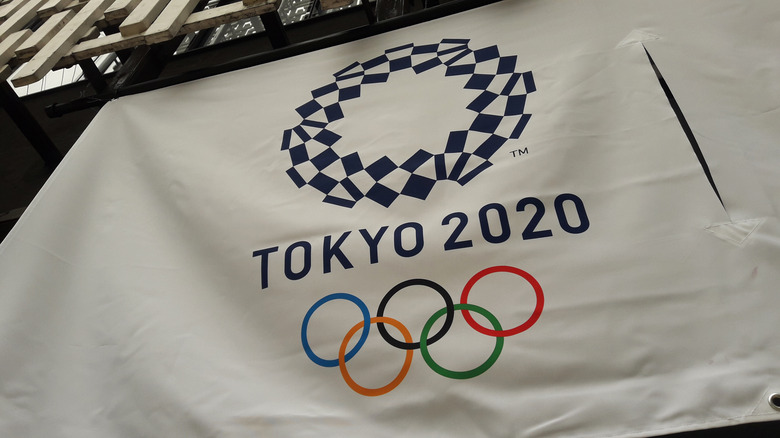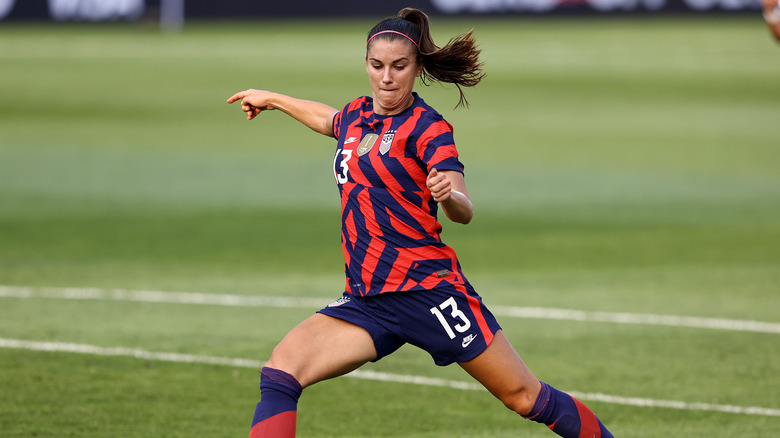Rules Athletes Will Have To Follow At The Tokyo Olympics
Every four years, the Olympics come to town. Of course, the town in question changes for each Olympic Games, and the athletic event historically holds promise for the selected city. However, 2020 brought the COVID-19 pandemic and, with it, a slew of cancelations. Pretty much everything in 2020 was postponed — including the 2020 Tokyo Olympic Games. However, 2021 brought the promise of the storied athletic display, and the Games are set to start on July 23, 2021. Yet, this will not be the Olympic Games of the past, as rules old and new are being heavily enforced.
We've all heard of the anti-doping rules, the guidelines put in place to curb any sort of cheating — these are the "typical" laws athletes at the Olympic Games have to follow, but what happens when COVID-19 is added to the mix? The Games are being held in Tokyo, where only about 2% of the population has been vaccinated against the virus. With this set of Games comes a whole new roster of rules, and we want to know about each and every one. Curious to know what the Olympics are going to look like this year? Here are the rules athletes will have to follow at the Tokyo Olympics.
This is what will happen if an athlete tests positive for COVID-19 while at the Olympic Games
Hopefully, every person who travels to Tokyo, Japan to compete in the Olympic Games is COVID-19 free. But if anyone happens to test positive while in Tokyo, there are rules. As noted by ABC News, any athlete who tests positive for the coronavirus will immediately be isolated or transported to a hospital to receive care, that is, if their case of the virus is significant enough. All approaches will be "in accordance with the instructions of the Japanese health authorities," who have been monitoring the virus within the country.
If an athlete who arrives in Tokyo tests positive for the coronavirus at the airport — as all athletes will be tested upon arrival — they will be transported in a designated vehicle to the Olympic and Paralympic Village, where a COVID-19 clinic has been established. From there, they must take a nasopharyngeal PCR test to confirm their initial positive test. If the PCR test result also is positive, the athlete will have to maintain isolation. Given that we're all a bit used to COVID-19 protocols by now, although strict, these rules make a ton of sense.
Unlike Olympic Games of the past, athletes can't sightsee while in Tokyo
London, Vancouver, Beijing, Sochi, Rio — all these cities have held Olympic Games, and, as such, athletes have gotten to compete while also taking in the sights. The Olympics are typically held in amazing locations that boast thriving cultures — especially where the summer Olympics are concerned (we're mostly thinking of the lack of snow), the athletes in question were fortunate to explore some amazing places. We're all still a bit jealous of the competitors who got to call Rio de Janeiro home for a couple weeks in 2016.
But, unlike Games of the past, athletes traveling to Tokyo for the 2020 Olympics are banned from any kind of sightseeing, as noted by NPR. In an attempt to curb the spread of COVID-19, the "Playbook" — an extensive set of guidelines presented to the athletes — requires that all athletes stay in their designated accommodations unless going to an official Olympic venue. So, aside from training, prepping for competition, sleeping, and then taking part in the actual event they're there to compete in, athletes can't do a whole lot else. While the Olympics isn't a vacation per say, this rule definitely takes some of the fun out of the experience.
Due to strict rules, athletes must miss out on this Olympic-defining experience
One of the best parts of the Olympics Games is the energy from the crowd. So much of athletics stems from the crowd, and many athletes have been known to excel during competition because of the support. But, due to COVID-19 restrictions, all spectators have been banned from the 2020 Olympic Games in Tokyo, as noted by ABC News.
Seiko Hashimoto, the president of Tokyo 2020's Olympics Organizing Committee, said that coming to this conclusion was tough, but that there was "no other choice" to be made. "We have been cornered into a situation where we cannot even stop now. We are damned if we do, and damned if we do not," Kaori Yamaguchi, a member of the Japanese Olympic Committee, noted (via AP News).
Of course, the rule doesn't just impact the athletes, but the economic status of Tokyo as well. As noted by AP News, local area businesses spent upwards of $3 billion to accommodate spectators — the local Tokyo economy will not see any kind of boost now, given that only the athletes and coaches will be present at the Olympic events and that they are unable to leave the Olympic Village.
Face masks are required of all athletes at the Olympic Games
There was a time when face masks meant the choice between clay, mud, seaweed, or detox — but the masks of 2020 and beyond reference the cloth or medical-grade coverings that we've all come to adopt into our daily lives. While mask mandates in parts of the world, namely the United States, have begun to dwindle, masks are still staples in many countries. Japan is one of them, and, as noted by the Playbook, face masks will be required "at all times." The only instances where athletes can go mask free are when they are "eating, drinking, sleeping, training or competing" — from the tone, it seems like the Olympic Committee is not messing around.
Furthermore, athletes have been encouraged not to sing, chant, or yell in support of fellow teammates and competitors. As included in the Playbook, clapping, instead, is encouraged, as any opening of the mouth can contribute to COVID-19 particles in the air. While mask wearing will be in high percentages, each room and common space will be ventilated every half hour to ensure athletes' safety.
Olympic athletes traveling into Japan face a slew of rules to follow
COVID-19 has rewritten the rules. From going to a coffee shop or the grocery store to traveling, everything has changed. Most of the world shut down travel when the pandemic was in its infancy, but as the Tokyo Olympics approaches, many countries have loosened traveling protocols and are sending athletes to the Games. However, once the athletes arrive in Japan, there are a number of rules they have to follow before they can even make it to the Olympic Village.
As noted by NPR, every athlete traveling to Japan for the Games (so you can exclude athletes who live in Japan) will be tested for COVID-19 twice. Before they travel to Tokyo, the competitors will be tested initially and then re-tested on another day, and both tests must be completed within a 96-hour window. Once they land in Japan, athletes will be tested again. In addition to the extensive testing, all Olympic hopefuls have to endure a three-day long quarantine once they arrive in Japan. They then must receive daily testing to maintain a negative status, as required in order to compete.
Olympic athletes will face retribution if they don't follow the rules of the Games
Typically, rules like the ones being imposed on athletes at the Tokyo Olympics are there for good reason — after all, the main goal is to keep everyone safe and healthy for competition. However, COVID-19 has brought huge obstacles to the 2020 Games, and, as such, those who break the rules will face grave consequences. As noted by The Washington Post, any athlete caught in Tokyo breaking the rules set forth by the Games could face "deportation proceedings," according to Toshiro Muto, CEO of the Olympics Organizing Committee.
Yes, you read that correctly. If an athlete goes against the rules of the Games — which are sure to be seriously enforced and monitored — they could potentially be deported from Japan. This is some serious business. The Olympics' executive director, Christophe Dubi, offered a very blunt interpretation of the rules. "Respect the Playbook, respect the rules," he said, as noted by AP News. He elaborated to The Washington Post, saying, "I am certain that an incredible majority will be respecting the rules ... everybody understands the importance for them as participants, but also for the Japanese people."
These physical distancing rules put in place might be tough to enforce at the Olympics
Wear a mask, wash your hands, stay six feet apart: This has been the line towed by just about every public health official since the beginning of the coronavirus pandemic, and the guideline has made a comeback for the 2020 Olympics. As mandated in the Playbook given to all athletes, competitors at the Games must maintain physical separation from one another and do everything they can to "keep physical interactions with others to a minimum." Athletes are required to "avoid physical contact," which includes embraces (such as sideline hugs) and handshakes.
The Playbook cites two meters as the appropriate distance to maintain between athletes, and the Olympians are encouraged to avoid inside spaces and groups whenever possible. Of course, this might be a bit tough to enforce. As noted by NPR, about 11,500 athletes are set to travel to Tokyo, in addition to 79,000 members of the press, game officials, and staff members. It will also be extremely tough to expect athletes not to embrace and support one another throughout their events, so all eyes will be on the lookout for proper social distancing.
The Olympic Games still enforces these controversial rules of the past
While many of the rules imposed on athletes at the 2020 Olympics are new, some of the rules are not — and, these such rules are, for lack of better words, a bit archaic. Most notably, countries who send athletes to the Olympics monitor any kind of drug use, but one instance in particular has cracked open how we think of drug rules when it comes to Olympic athletes.
As noted by CNN, U.S. sprinter Sha'Carri Richardson, one of the fastest runners in the world, was banned from competing in the 2020 Olympics after testing positive for marijuana. The NCAA prohibits athletes from using the substance, and the U.S. Anti-Doping Agency additionally monitors the drug use, but there has been substantial debate about Richardson's circumstance in the wake of her disqualification: Richardson used cannabis in the state of Oregon, where it is legal — the drug has also been known to limit performance. However, as CNN reported, "Everyone from the head of the US Anti-Doping Agency, Travis Tygart, to President Joe Biden is sad about this, but they're also intent on following the rules." Richardson, however, has received tons of support from the public, including celebrities like Halle Berry and Anthony Mackie.
Rules were enforced to limit athletes from politically protesting at the Olympic Games
Additional rules — apart from the ones already mentioned — are being implemented at the 2020 Olympics, yet these have gotten a bit less attention. Most notably, athletes will face serious consequences about expressing their political beliefs during the Games, and the rules seem to tread into some hot water.
As noted by The New York Times, the International Olympic Committee, or IOC, announced, "All demonstrations would be forbidden on the medals podium, on the field of play during competition and at the opening and closing ceremonies." So when we think of standout political Olympic moments — like the 1968 Black Power Protests — any demonstration remotely similar at the 2020 Olympics is banned.
The rules beg the question as to why athletes use the Olympics as an opportunity to express their political and personal beliefs. Well, the Games just so happen to be one of the biggest stages in international history, and as sporting events have become more and more politically charged in recent years, the venue serves as a chance to get important messages out to the world. The rules imposed will almost certainly have a noticeable impact.
Athletes must use these types of vehicles to get around the Olympic Village
We have to admit, there is something about the Olympics — aside from the incredibly impressive athleticism — that is really amazing. Cities undergo dramatic transformations just to adapt to the Games: Hotels are built, Olympic Villages are established, attractions are designed, and facilities are provided just for the occasion. There's something alluring about the idea of staying in the athletes' village or being taken from one arena to the next in designated Olympic vehicles.
It all sounds great, but the 2020 Olympics in Tokyo won't have the same kind of allure, especially when it comes to transportation. As noted by the Playbook that all athletes receive, competitors in the 2020 Olympics can only use "dedicated Games vehicles." What does this mean, exactly? Well, as noted by ABC News, Olympians in Tokyo — with the exception of those who already live in Japan — are "banned" from taking any kind of public transportation during their first two weeks in the country. Exceptions are only granted if public transport is the only means to get athletes to a remote venue. Talk about a shift in the rules.
Some athletes have rules imposed on them before they even make it to the Olympics
Let's talk about some of the restrictions placed on Olympians before they even make it to the Games. We're talking about Christine Mboma and Beatrice Masilingi, two female runners from Namibia who have been banned from the 400-meter and 1,600-meter running events. Before we go on, we just want to take a moment to warn you that the reasoning is absurd.
As noted by Sports Illustrated, Mboma and Masilingi were found to have "a natural high testosterone level" by Namibia's National Olympic Committee. As such, they are only able to compete in the 100-meter and 200-meter races, not to mention other harsh rules placed on them. The runners are two of the best athletes in the world, and the rules imposed on them before they've even made it to Tokyo must be seriously frustrating for them.
In the wake of the announcement, Namibia's National Olympic Committee released a statement: "It is important to understand that both our athletes were not aware of this condition neither did any family member, their coach or the NNOC-CGA [Namibia Olympic Committee] were aware of it." This is seriously unfair, in our opinion.
Olympic athletes have to follow these strict track-and-trace rules
One of the biggest components of battling COVID-19 is locating the source — now known as tracking and tracing, determining the origin of a coronavirus strain is imperative in curbing its spread. As such, officials at the 2020 Olympics in Tokyo are taking extra precautions and, as a result, require athletes to download Japan's Contact Confirming Application on their smartphones. Honestly, in the world of COVID-19, how could we have survived this long without our phones?
As noted by the Playbook, the "health reporting app" is designed to help track any outbreak of COVID-19 among competitors. Before the Games take place, athletes were encouraged to "familiarize" themselves with the app and the "technology solutions" in place to help curb any spread of the virus. The Playbook also includes the protocols to implement should anyone catch the coronavirus. If athletes find themselves to be in close range to a positive case while at the Games, they will be notified by Japanese health authorities, as will their team and the Tokyo 2020 officials.
This rule regarding Olympic athletes and alcohol is just a little odd
Then there are some rules that athletes must comply with at the 2020 Olympics that seem a bit out of left field. These rules concern alcohol and condoms, and, no, we're not kidding. As noted by Bustle, athletes at the 2020 Olympic Games cannot buy alcohol during their stay at the Olympic Village. However, that doesn't mean that they can't drink in their accommodations; they just have to bring the alcohol from outside the premises.
What is the reason for this odd rule? It turns out that, according to the outlet, this is the Olympic Committee's attempt to encourage "athletes to drink alone," rather than socialize with each other to help stop the spread of COVID-19. In addition, the Olympians can't have alcohol in any shared space or public location. We're not entirely sure what's worse — Olympic athletes at the top of their game being in the same room as one another or getting boozy on a bottle of wine by themselves.
Then there are the rules regarding condoms. Unlike years past, the 2020 Olympics will not see any free condoms handed out. We didn't even know this was a thing at previous Games, let alone that the rule has changed for Tokyo. What a crazy time we're living in.
Athletes must abide by this impactful rule at the Tokyo Olympics
This is one of the saddest rules of the 2020 Tokyo Olympics. As noted by Newsweek, the International Olympic Committee, or IOC, ruled that athletes could not have their children or other family members accompany them to the 2020 Games — one Olympic gymnast, in fact, will not have her mother present for a different reason, however.
This rule is just one of many put in place to help curb the spread of COVID-19. "Given that the Tokyo 2020 Games will take place during a pandemic, overall we must unfortunately decline to permit athletes' family members or other companions to accompany them to the Games," the IOC remarked in a statement.
However, this particular rule did not go over well, prompting the IOC to walk back some of the barriers. After the pushback, the Committee decided that athletes with small children, particularly those with infants, could have their kids at the Games. The IOC admitted that athletes who have to nurse their small children are in "a unique situation," but the slight adjustment to the rule didn't go over well with most. U.S. soccer player Alex Morgan made her feelings about the matter clear, saying, "Is that determined by the mother or the IOC? We are Olympic mothers telling you, it is NECESSARY." Time will tell how this situation plays out.
